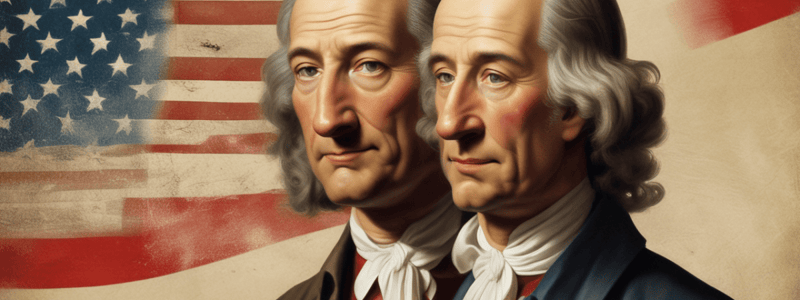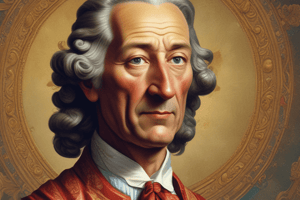Podcast
Questions and Answers
What was John Locke's primary view on the relationship between the ruler and the ruled?
What was John Locke's primary view on the relationship between the ruler and the ruled?
- The ruled must obey without question.
- The ruler can decide to take away property at will.
- The ruler has absolute authority over the ruled.
- Governance is an agreement or compact between the ruler and the ruled. (correct)
Which of the following concepts was NOT a key contribution of John Locke?
Which of the following concepts was NOT a key contribution of John Locke?
- Right to resist unjust rulers
- Divine right of kings (correct)
- Private property
- Consent to be ruled
According to Locke's political views, what happens when government abuses its power?
According to Locke's political views, what happens when government abuses its power?
- The ruled must accept their fate.
- The rulers gain more authority.
- Obedience to the laws becomes mandatory.
- The governed have the right to withdraw consent. (correct)
Which statement best reflects Locke's idea about property?
Which statement best reflects Locke's idea about property?
What is meant by 'tacit consent' in Locke's philosophy?
What is meant by 'tacit consent' in Locke's philosophy?
What was John Locke's view on the nature of governance?
What was John Locke's view on the nature of governance?
How did Locke's ideas on property differ from those of Hobbes?
How did Locke's ideas on property differ from those of Hobbes?
What rights do individuals have according to Locke when a government abuses its power?
What rights do individuals have according to Locke when a government abuses its power?
What does Locke mean by 'tacit consent'?
What does Locke mean by 'tacit consent'?
In which work did Locke outline his political beliefs, including government consent?
In which work did Locke outline his political beliefs, including government consent?
Flashcards are hidden until you start studying
Study Notes
The Philosopher Who Influenced The American Revolution
- John Locke (1632-1704) is the philosopher who had the greatest influence on American political thought and the American Revolution.
- Locke believed that governance is an agreement, or a compact, between the ruler and the ruled.
- He argued that all men were created equal by the Creator and that they have the right to resist unjust rulers.
Locke's Key Concepts
- Private property: Locke believed that property is the result of personal labor, and no one has the right to take it away.
- Consent to be ruled: Locke argued that government legitimacy depends on the consent of the governed.
Locke's Ideas on Governance and Power
- Individuals surrender some of their individual authority to a ruler, who acts as a mediator or arbitrator of disputes, to have order.
- When government abuses its power, the governed have the right to withdraw their consent and change the government.
Locke's Second Treatise on Government
- Published in 1689, it outlines Locke's ideas on consent, private property, and governance.
- Sect. 119: Every man gives tacit consent to obey the laws of a government when they have possessions or enjoyment within its territories.
- Sect. 122: When legislators try to take away property or reduce people to slavery, they are in a state of war with the people, who are absolved from further obedience.
The Philosopher Who Influenced The American Revolution
- John Locke (1632-1704) is the philosopher who had the greatest influence on American political thought and the American Revolution.
- Locke believed that governance is an agreement, or a compact, between the ruler and the ruled.
- He argued that all men were created equal by the Creator and that they have the right to resist unjust rulers.
Locke's Key Concepts
- Private property: Locke believed that property is the result of personal labor, and no one has the right to take it away.
- Consent to be ruled: Locke argued that government legitimacy depends on the consent of the governed.
Locke's Ideas on Governance and Power
- Individuals surrender some of their individual authority to a ruler, who acts as a mediator or arbitrator of disputes, to have order.
- When government abuses its power, the governed have the right to withdraw their consent and change the government.
Locke's Second Treatise on Government
- Published in 1689, it outlines Locke's ideas on consent, private property, and governance.
- Sect. 119: Every man gives tacit consent to obey the laws of a government when they have possessions or enjoyment within its territories.
- Sect. 122: When legislators try to take away property or reduce people to slavery, they are in a state of war with the people, who are absolved from further obedience.
Studying That Suits You
Use AI to generate personalized quizzes and flashcards to suit your learning preferences.




